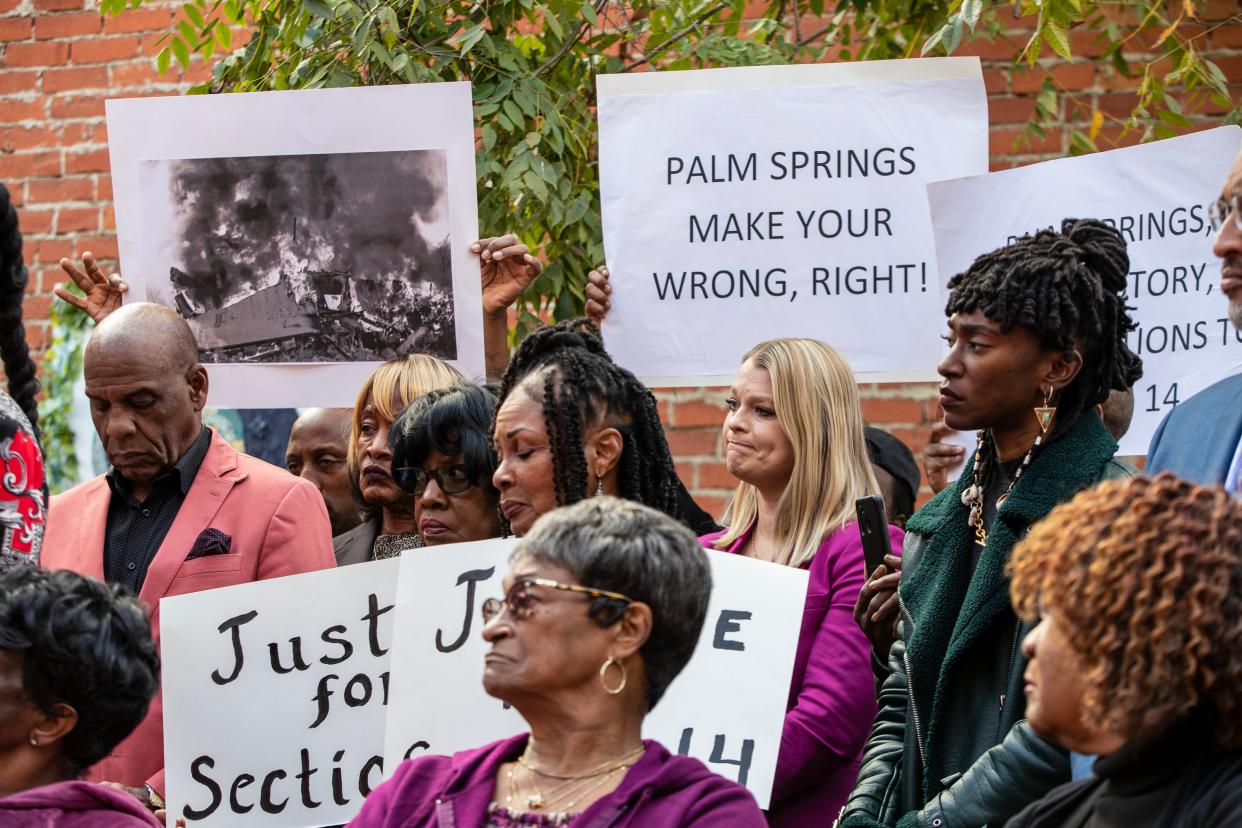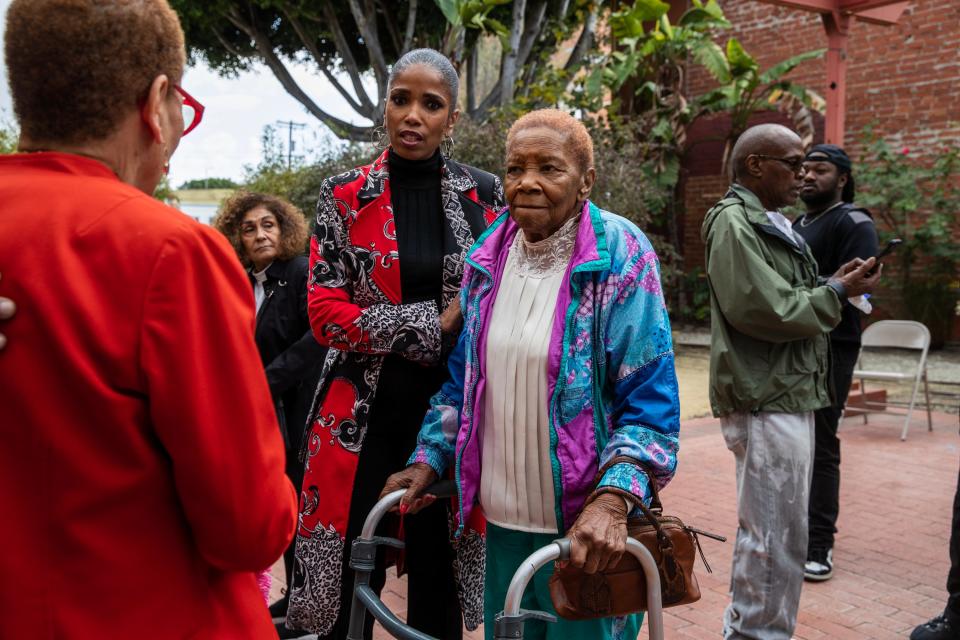Group pushing Section 14 reparations dramatically increases amount sought from Palm Springs

A group advocating for the payment of reparations to those evicted from the Section 14 land in Palm Springs during the 1950s and 1960s, and their descendants, filed an amended claim Tuesday that dramatically increases the amount it says the city owes.
The claim estimates the value of the harm caused by the evictions to be "upwards to $2 billion." An economist working with the group, Julianne Malveaux, said Tuesday that she estimates the harm ranges from $400 million to $2 billion. That's up sharply from a proposal in August that sought $100 million in direct payments, plus other benefits including down payment assistance and college scholarships. A few months before that, in May, an initial claim said only that requested damages would exceed $1 million.
Malveaux said the $2 billion figure is "not the number the group is necessarily asking for," but the one it is coming to the table with. She said the families and their representatives are instead asking for the city to deal with them "in good faith" to come up with fair compensation that reflects the real harms they suffered.
In a statement Tuesday, Mayor Lisa Middleton did not respond to the amounts but said the city "has an obligation, not only to those who were displaced, but also to its residents, businesses and taxpayers, to thoroughly investigate the history as it develops remedial programs that are fair to everyone."
The statement outlines steps the city has taken to address the fallout of the evictions, which took place from 1959 to 1967. The latest is the city's posting last week of a request for proposals seeking a firm to research "the historical context of residents displaced from the Section 14 land" and help the city develop "a reparations program to enhance the quality of life for those affected by this displacement." Once a firm is selected in January, that work is expected to take a year, the document says.
In a stark escalation of rhetoric, the new claim submitted Tuesday describes the Section 14 evictions as "akin to the 1921 Tulsa Burning Massacre," in which a white mob burned and destroyed a 35-block area of Tulsa known as Black Wall Street. The state of Oklahoma estimates that 100 to 300 people were killed in that massacre. The Section 14 Survivors group has never contended that anyone was killed during the evictions.
In addition to people who lived on Section 14, local and state politicians supporting the push for reparations spoke at a related event held at a community center in South Los Angeles, more than 100 miles from Palm Springs. They included Palm Springs Councilmember Christy Holstege and a state senator from L.A. County, Steven Bradford.
Holstege, whose race for state Assembly is still too close to call, and Bradford both said they are committed to pursuing legislation that could lead to the state paying reparations to the Section 14 families.
Noting Palm Springs' entire city budget is about $232 million this year, Holstege said it's hard for the city alone to properly compensate people, which is why she supports the state being involved.
All the claims including Tuesday's have been filed directly with the city, not in court, but such claims can be precursors to lawsuits if they are not settled. Areva Martin, the L.A.-based lead attorney for the group, said Tuesday that she filed a formal tort claim because that is what the law requires. But she said the families hope to negotiate in good faith with the city, although they could sue if they can't reach a satisfactory resolution.
She also said she believes a 2021 resolution passed by the city council apologizing for the harm caused by the evictions, and directing city staff to start a process to compensate those with ties to Section 14, is legally binding on future council members.
Holstege said she would not offer a legal opinion, but that the council recognized the "risk of liability" when it issued an apology and took action recognizing the city's role.
"I think the city council has already weighed that risk and chose to move forward because it is the right thing to do," she said.
A long history
The land known as Section 14 is a square mile east of downtown owned by the Agua Caliente Band of Cahuilla Indians and its members. For decades, it was home to many people of color, who either rented homes or built their own there because racist housing policies denied them the ability to buy homes elsewhere in the city.
When changes in federal law allowed longer leases on tribal land, the tribe sought to redevelop the area, which now includes a tribe-owned casino and resort. The city led many of the evictions and destruction of homes, with a city firefighter lighting a match in at least one case.
Many residents reported that they were given little or no notice before their homes were burned. But other people, including some former city leaders, say the evictions were necessary and gave the tribe control of its land.
And a group of residents compiled a report about Section 14 challenging assertions made by current city officials. The Friends of Frank Bogert pointed to evidence they say shows those renting on Section 14 either had no leases or 30-day leases and were given adequate and legally required notice of the evictions.
Martin said her clients are not seeking any damages from the tribe or its members. She said any discussion of whether the tribe covers part of the cost of reparations is between the tribe and the city.
“It was the city that hatched this plan, and it was the city that hired the contractors, and it was the city that engaged its fire departments,” Martin said.

In late 2021, the Palm Springs City Council formally apologized for the city's role in the evictions. A 1968 report by the California attorney general described the Section 14 destruction and removals as "a city-engineered holocaust."
On Tuesday, Martin told The Desert Sun that the amount of damages mentioned in previous proposals came before she took over as the group's lead attorney. She said the amount in the new claim comes from a "preliminary harm assessment" that she commissioned and reflects economic and emotional harms.
The updated claim says the city's bulldozing and burning of properties on Section 14 deprived residents of their property rights. In their earlier report, the Friends of Frank Bogert point to a statement in the attorney general’s report saying Section 14 residents' due process rights were not violated.
When asked if families would be required to prove they had a lease that was violated, Martin said her group plans to develop a process to verify whose property rights were violated.
"What that process is is yet to be determined, but there are genealogists, sociologists, economists, lawyers like myself and other smart people who can figure that out," she said.
Paul Albani-Burgio covers breaking news and the City of Palm Springs. Follow him on Twitter at @albaniburgiop and via email at paul.albani-burgio@desertsun.com.
This article originally appeared on Palm Springs Desert Sun: Section 14 group increases reparations sought from Palm Springs

